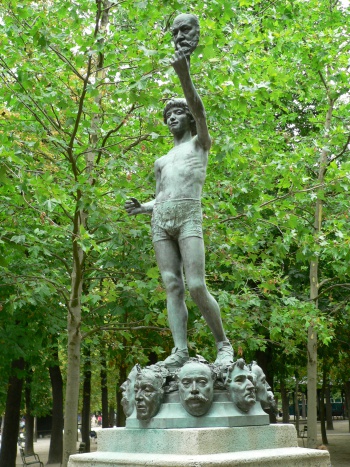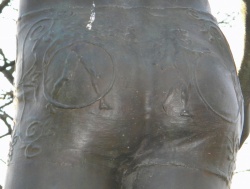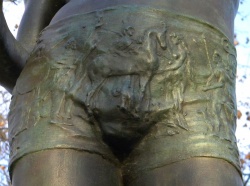The Mask Seller (Zacharie Astruc): Difference between revisions
No edit summary |
No edit summary |
||
| Line 1: | Line 1: | ||
[[Image:ASTRUC Zacharie 1883 Le marchand de masques 1536x2048.jpg|350px|right]] | [[Image:ASTRUC Zacharie 1883 Le marchand de masques 1536x2048.jpg|350px|right]] | ||
'''The Mask Seller''' is a bronze statue | '''The Mask Seller''' is a bronze statue by the painter, poet, critic and French sculptor Zacharie Astruc, in 1883. | ||
The work is exhibited in the Luxembourg Gardens, Paris. | The work is exhibited in the Luxembourg Gardens, Paris. | ||
Revision as of 03:29, 14 February 2013

The Mask Seller is a bronze statue by the painter, poet, critic and French sculptor Zacharie Astruc, in 1883.
The work is exhibited in the Luxembourg Gardens, Paris.
This sculpture depicts a young boy standing, wearing only a pair of figure-hugging shorts embroidered with mythological designs and a pair of sandals. Supported on the right leg, he holds in his left hand lifted above him a mask of Victor Hugo. At his feet around the base are other masks representing famous characters from the end of the 19th century (writers, painters, musicians, a sculptor, and a single politician).
Boylove References

It is probably no coincidence that the pattern decorating the left buttock of the boy is a reproduction of a drawing of the famous crater type Greek red-figure pottery of the 'Berlin painter[1]", representing Ganymede naked with a hoop and a rooster. While leaving out the other side of the vase, where the tip of Zeus’s spear completes the sexual symbolism, this discreet evocation is clearly pedosexual..

The front of the shorts are just as amazing, a horse covers the boy's quite prominent defining characteristic. What is the suggestion here? That there is a possibility that the horse will rear up? Or is it an allusion to the myth of Ganymede, which Zeus compensated his removal by offering his father wonderful horses? One should note however, that the animal is being petted by the hand of a woman.
Taken in its entirety, it could be interpreted as an affirmation and an illustration of the sexual character, both desirable and desiring, of adolescence, while at the same time, its bisexual nature.

Notes et références
- ↑ Jardins du Luxembourg : 48° 50′ 46.32″ N, 2° 20′ 18.44″ E.
